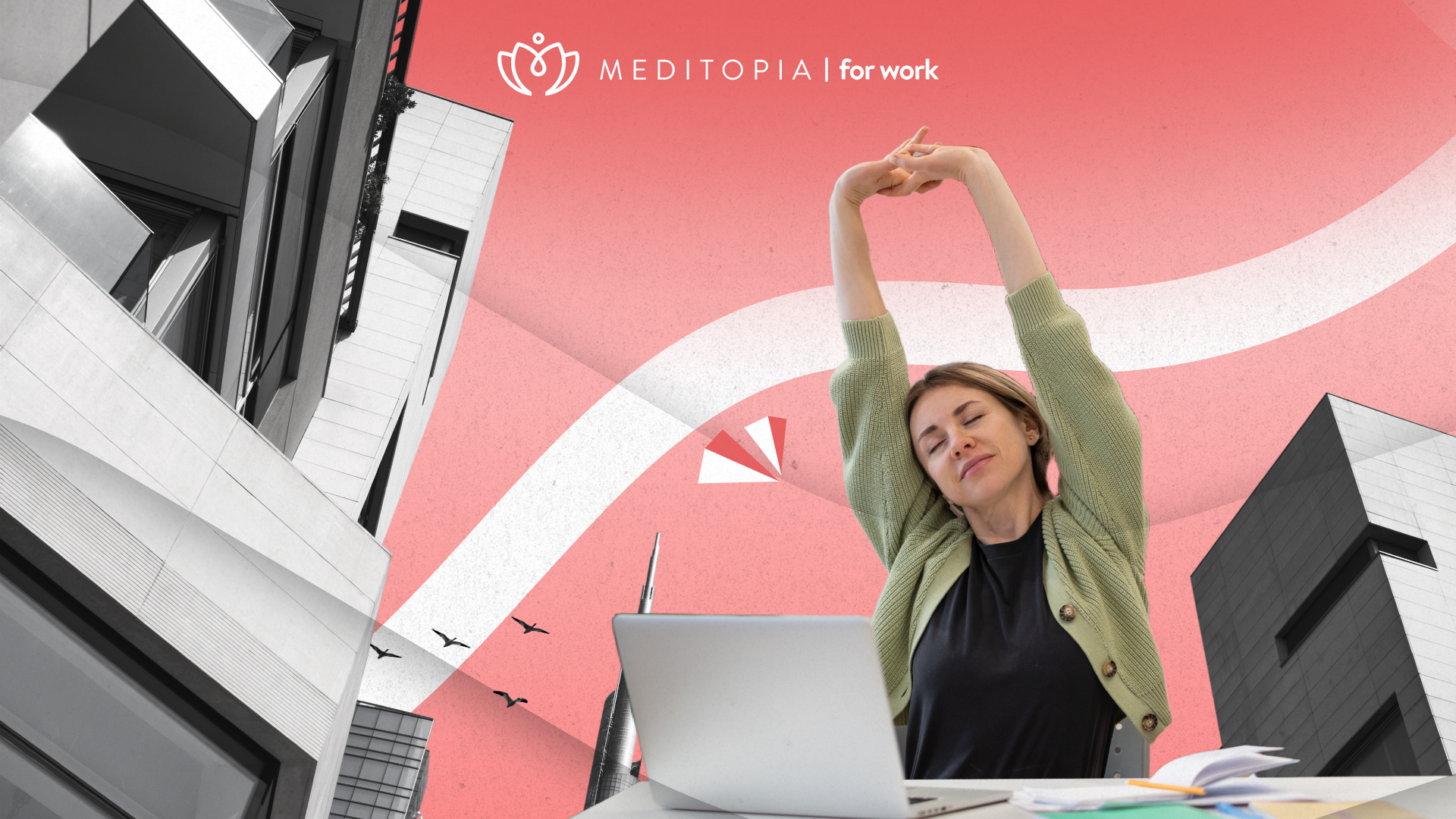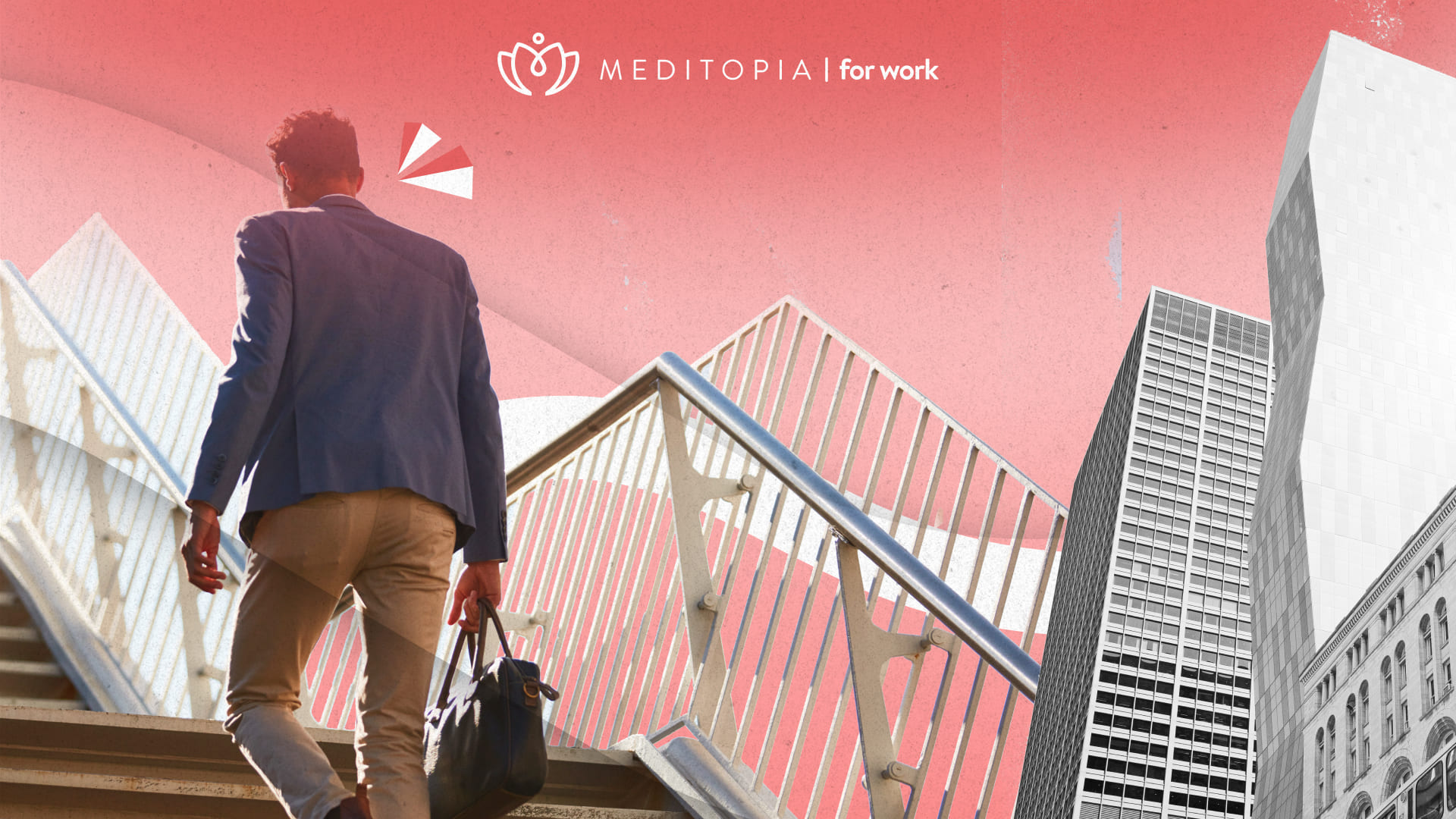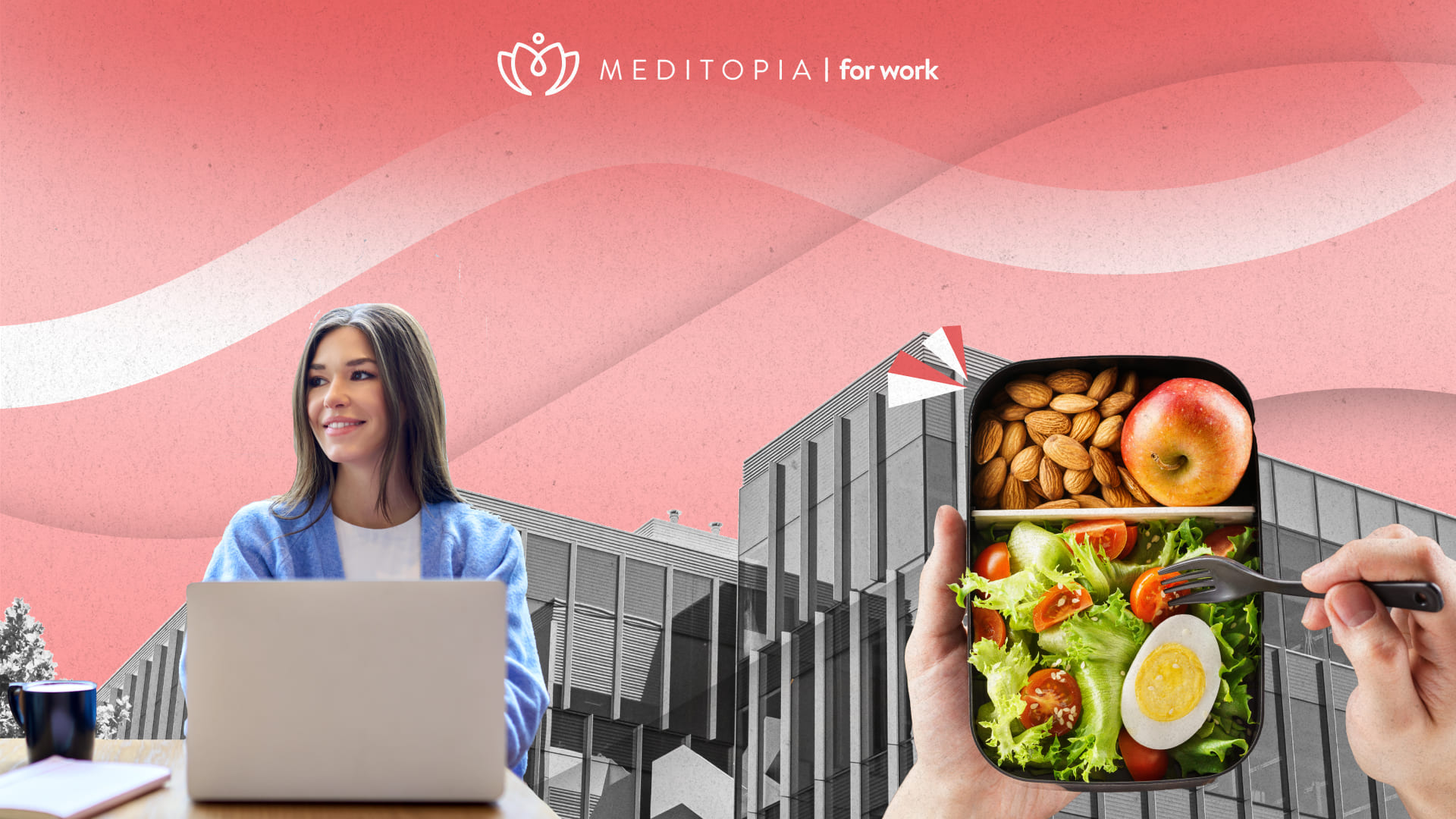Long hours standing, high emotional labor during peak seasons, and unpredictable schedules. That's what makes the retail industry so uniquely prone to high turnover. Replacing a single employee can cost anywhere from 50% to 200% of that employee’s annual salary due to recruitment, training, and lost productivity [1], but wellness programs for retail have shown quick effectiveness. Let's discover more!
Why Wellness Matters: Retail Sector Benchmarks
Retail employees often experience a combination of physical, emotional, and psychological stressors that make wellness support essential. In fact, 84% of frontline employees reported feeling burned out, with retail workers among the most affected due to job intensity and lack of flexibility [2]. Here's why wellness is so important in the retail sector:
- A staggering 84% of retail workers report declining mental health over recent years, situating retail in the bottom 10% of all industries for workplace mental wellbeing [3].
- Approximately 55% of retail professionals experienced burnout in the past year, according to a recent industry-wide survey [4].
- 44% of frontline retail employees in the U.S. considered leaving their jobs within three to six months, with 72% of those who quit leaving the industry entirely [5].
- Research in Ireland found that 68% of retail workers experienced abusive behaviour during their careers [6].
Common Mental Health & Wellness Challenges
As you can see, retail environments bring unique stressors that can severely impact employee health and engagement. Here are some of the most pressing challenges for retail teams:
- High turnover rates due to burnout, low job satisfaction, and limited growth opportunities.
- Workplace fatigue from extended standing hours, repetitive tasks, and lack of rest breaks.
- Emotional exhaustion caused by constant customer interaction and employee conflict management.
- Low usage of wellness initiatives, often due to stigma, benefits communication plans, or lack of mobile-friendly tools.
- Poor work-life balance driven by erratic scheduling and limited flexibility.
These challenges are especially critical in deskless and shift-based roles, where employees may not have access to traditional HR communications or wellness portals.
Meditopia for Work takes care of this transition for you, send us a message to discuss how can we improve your retail employees' mental health in 8 weeks.
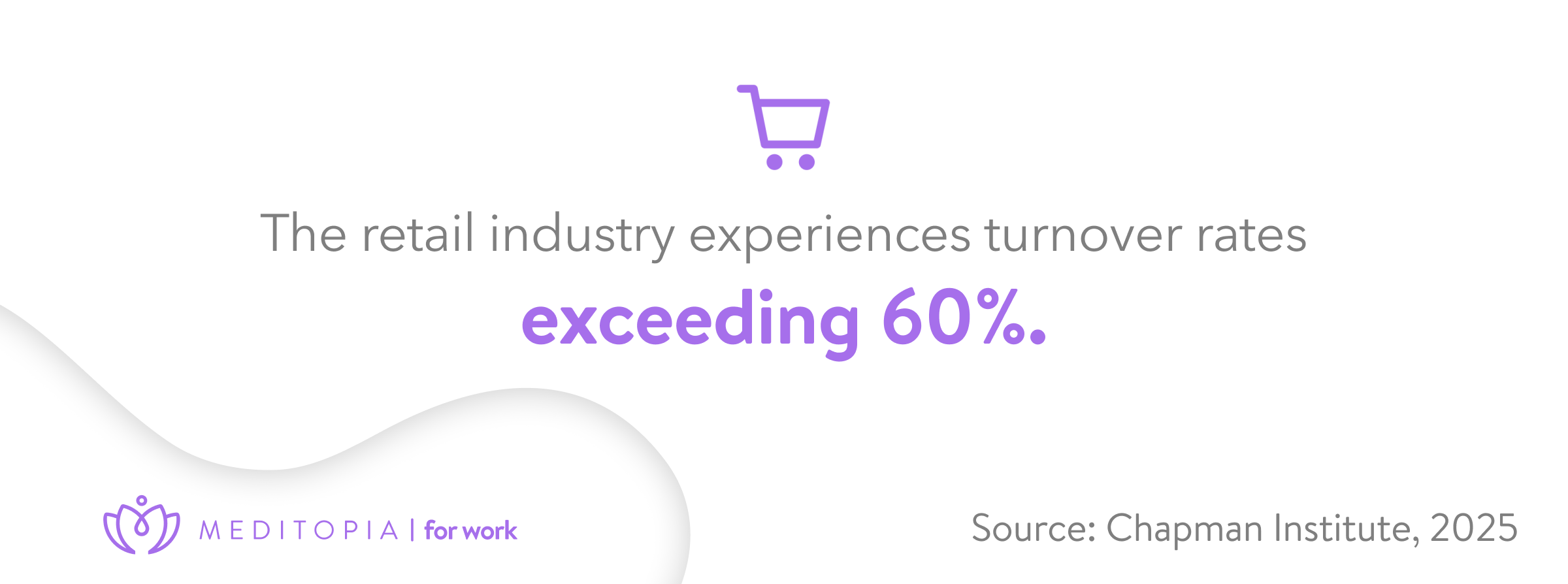
What an Effective Wellness Program Looks Like in Retail
To truly serve retail teams, wellness programs must meet their unique operational and emotional needs of this sector. The most effective retail wellness programs are those that are:
- 24/7 accessible via mobile apps or SMS to accommodate shift workers and store associates.
- Anonymous and stigma-free, encouraging usage without fear of judgment.
- Culturally and linguistically inclusive, especially for multinational or multilingual staff.
- Designed with burnout prevention in mind, offering tools like microbreaks, mindfulness, and emotional resilience training.
- Flexible and modular, allowing group sessions (e.g., stress management workshops) or individual tools (e.g., 1:1 therapy or self-guided content).
- Capable of reaching deskless teams without relying on company email or intranet access.
In summary: The best programs are built with industry-specific wellness features, ensuring that content is directly relevant to the challenges faced by frontline and back-of-house retail employees.
This includes coping strategies for high-stress roles, stress management tools, and support systems that are seamlessly integrated into daily routines.
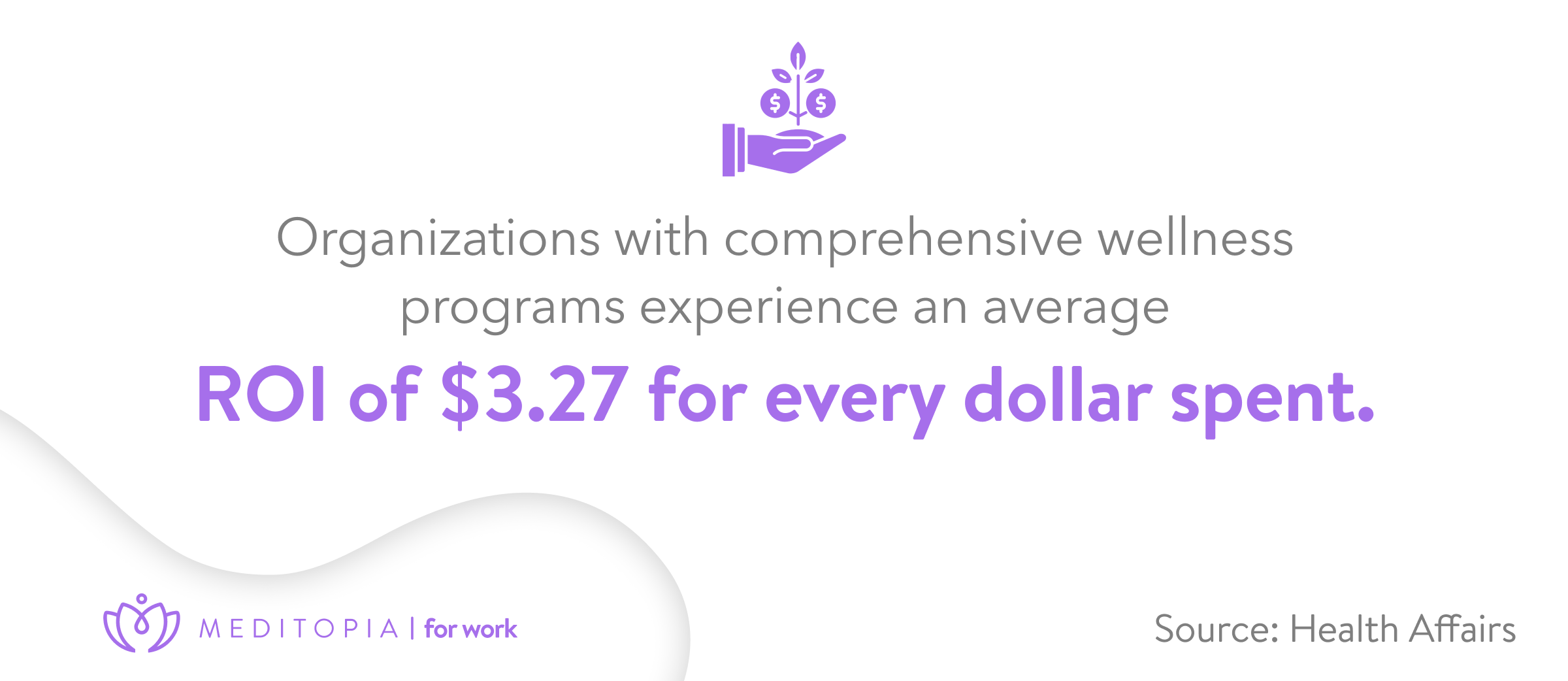
Example Wellness Program Benefits for Retail
Implementing a tailored wellness program for retail employees can drive measurable outcomes, especially around on-the-job fatigue, mental health support, and shift work support. Let's check some:
- Reduce sick days & absenteeism: A study reviewing 56 evaluations found that effective wellness programs cut absenteeism by up to 25% [7].
- Another source reports an average reduction of 1.8 sick days per employee annually in companies with robust wellness initiatives LinkedIn [8].
- Enhance productivity: Research found a 10% increase in productivity among workers who improved their health through wellness programs [9].
- Support frontline schedules & shift work: Wellness programs accessible during nontraditional hours help employees manage stress and fatigue tied to irregular retail schedules.
- Strengthen mental resilience via mental health support: Access to mental health tools such as therapy, mindfulness for work, or stress-management content helps employees cope with emotional strain and reduce burnout. While retail-specific data is limited, employers generally report increased engagement and attendance when mental health resources are provided.
How Leading Retail Companies Approach Wellness
So, now you know more about the mental health landscape in the retail industry, and what wellness programs can do to improve it. But what have other companies done before? What has worked for them? Let's check it out:
Sephora
Sephora has built a reputation as an employee-first retailer, earning a place on PEOPLE’s 100 Companies That Care list in 2025 for its commitment to staff wellbeing and flexibility.
Key points of the program:
- Flexible scheduling to support work-life balance
- Same-day pay options through Dayforce Wallet to reduce financial stress
- Focus on aligning employee benefits with real-life needs of retail workers
Results: Strengthened employer brand and public recognition as a leading caring employer [10].
Kroger
As one of the largest U.S. grocery chains, Kroger recognized the need to refresh its wellness strategy to better connect with its 450,000+ employees across stores and distribution centers.
Key points of the program:
- Relaunched wellness campaign after low participation in earlier efforts
- Improved communication and messaging tailored to frontline teams
- Greater emphasis on making wellness approachable and relevant for store associates.
Results: Improved employee engagement in wellness efforts, demonstrating the critical role of communication in program success [11].
Target
Target emphasizes wellness through competitive pay, financial flexibility, virtual care, and mental health access—aiming to support both employees and their families comprehensively.
Key points of the program:
- Offers 24/7 virtual medical care through CirrusMD, free for all team members.
- Delivers mental health support at no cost.
- Includes generous benefits suite: competitive pay, education assistance (“Dream to Be” tuition‑free programs), paid family leave, childcare support, and financial benefits like 401(k).
Results:
- A comprehensive support system that addresses financial, health, development, and family needs—creating a robust environment conducive to employee retention and satisfaction [12].
Walmart
As the largest private employer in the U.S., Walmart has made a substantial investment in holistic employee wellness, covering mental health, education, and overall well-being across its massive workforce.
Key points of the program:
- Offers up to 20 free mental health coaching or therapy sessions.
- Conducts Mental Health First Aid training (online and in-person) to equip associates with skills to recognize and respond to mental health challenges.
- Through its Live Better U program, Walmart offers education benefits—$1-per-day tuition toward certifications and degrees in health, wellness, and other fields, with strong engagement and measurable outcomes.
Results:
- High accessibility to mental health services; normalized support culture among associates.
- Enhanced mental health literacy through training.
- Thousands of employees earning certifications and degrees; Live Better U participants are twice as likely to be promoted and demonstrate higher retention rates [13].
The Future of Wellness in Retail
As the wellbeing space evolves, AI, wearables, and mobile-first wellness apps are transforming how retail employees engage with wellness, especially in fast-paced, deskless environments. This is how the furute of wellness in retails looks like:
- AI-Driven Personalization & Predictive Insights: AI-powered platforms can analyze data from wearable devices, health records, and user inputs to offer tailored health recommendations, early intervention alerts, and real-time wellness monitoring.
- Wearables & Mobile Apps Boost Engagement: Adoption of wearable devices continues to expand, engagement metrics also show promise: users who interact actively with wearable data are 30% more likely to reach their fitness goals [14].
- Retail-Specific Innovation: A global retail chain implemented an AI-based wellness challenge system, cleverly tailored to employees’ health data—and as a result, saw a 30% increase in participation in wellness programs within just six months [15].
Meditopia for Work: Wellness That Fits Retail
Retail teams require fast, accessible, and flexible support that fits their dynamic schedules and physical demands. That’s exactly where Meditopia for Work delivers value, by aligning wellness tools with the real-world needs of retail environments.
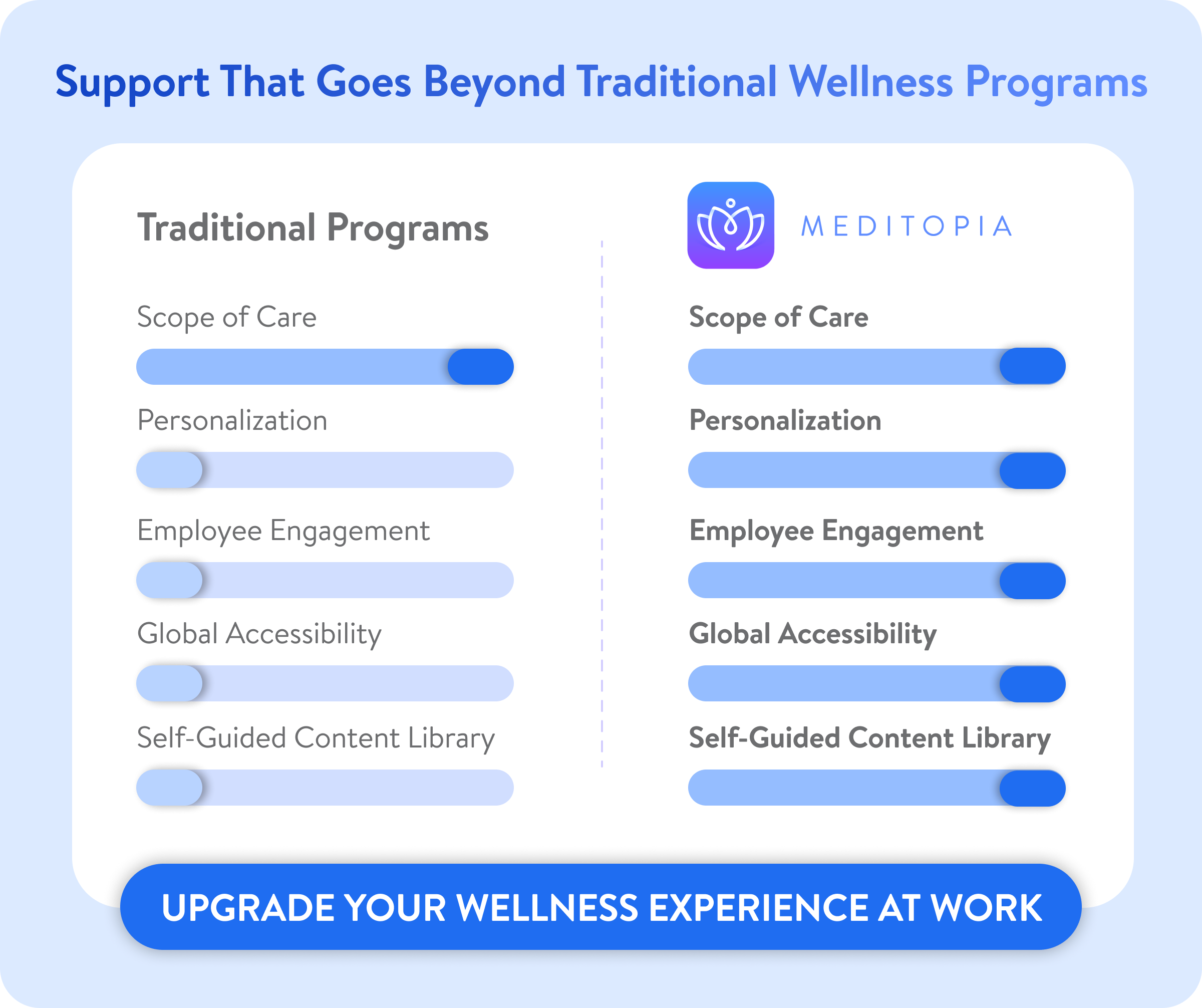
- Mobile-first design ensures employees can access wellness resources anytime.
- Specialized webinars and workshops provide targeted learning on stress management, communication, and resilience.
- Mental health support is personalized and stigma-free, offering therapy, meditation, and emotional coaching in 14 languages.
- Soul, Meditopia’s AI mental health companion, provides real-time emotional assistance.
- Proven efficacy: Users report a 27% reduction in stress and a 21% increase in positive emotions within just eight weeks of consistent use.
- Short, effective content helps manage on-the-job fatigue with quick check-ins, breathing exercises, and self-care strategies.
- Shift work compatibility means resources are available 24/7, online and offline.
- Anonymous usage and automated onboarding remove barriers for employees hesitant to seek help or navigate complex platforms.
- Employees gain access to a network of dedicated experts, including therapists, personal trainers, nutritionists, legal and financial advisors, and even veterinarians.
- Cultural relevance ensures localized content resonates with diverse frontline teams.
By embedding Meditopia into daily retail workflows, companies can reduce turnover, improve morale, and build a culture where wellness is both accessible and expected.
Explore Employee Wellness Programs Across Industries
Employee wellness evolves with the realities of each sector. Discover how industries tailor their programs and what’s trending across the wellness landscape.


